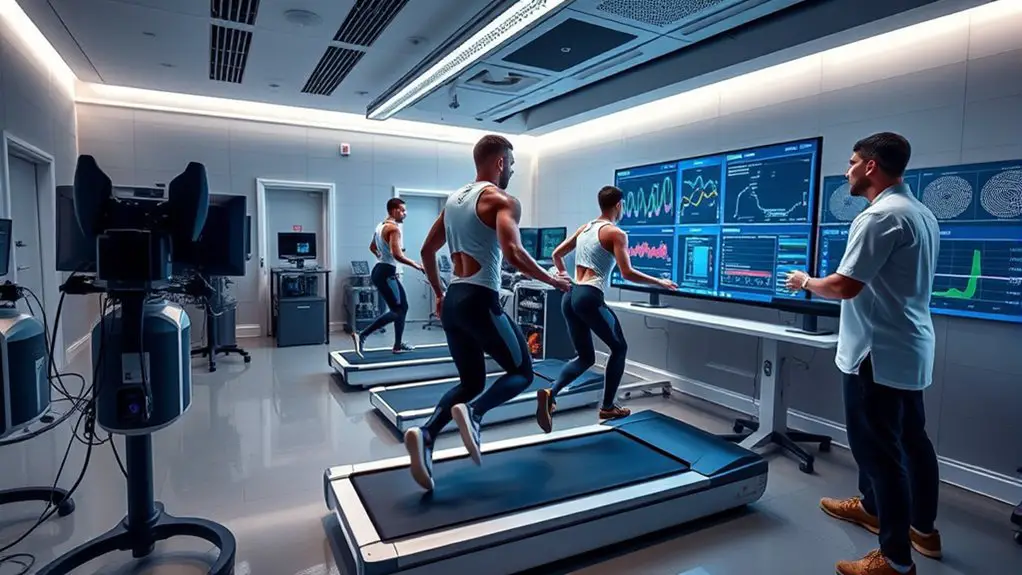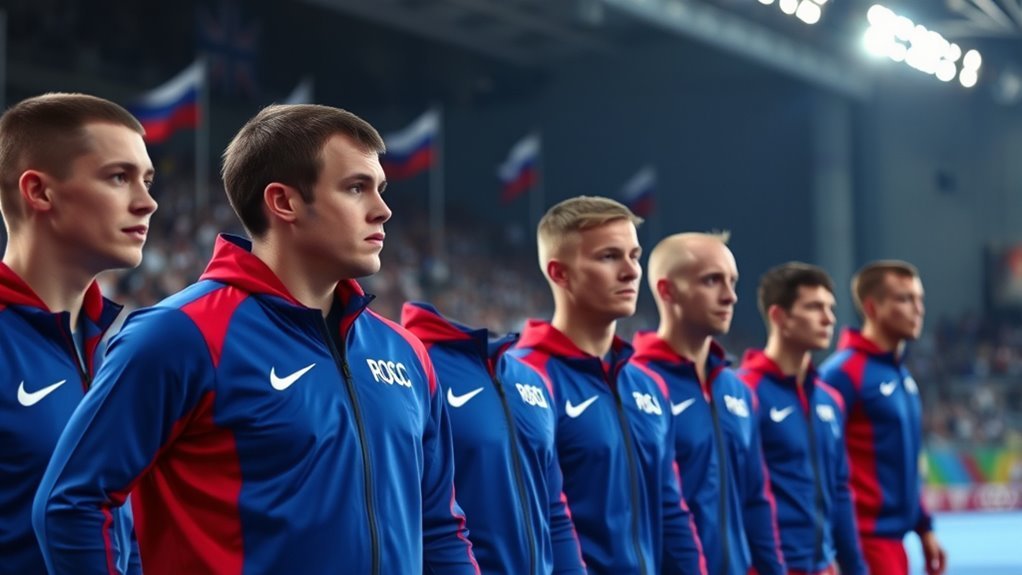AI is changing sports analytics by helping teams, coaches, and athletes make data-driven decisions. You'll see how predictive analytics can anticipate player performance and how real-time tracking keeps athletes at their best. It enhances game strategies by analyzing opponents, predicting injuries, and personalizing training regimens. Additionally, AI transforms fan engagement with tailored experiences and streamlined broadcasts. There's so much more to uncover about AI's impact on the sports world.
The Rise of Data-Driven Decision Making in Sports
As sports teams increasingly rely on data to inform their strategies, it's clear that the era of data-driven decision making is here to stay. You can see it in how coaches analyze player performance, game tactics, and even fan engagement. This shift means teams are making choices based on cold, hard facts rather than gut feelings. You're empowered to embrace this freedom; data offers insights that can elevate your understanding of the game.
Imagine the thrill of knowing exactly what works and what doesn't. With advanced analytics, you can identify trends, optimize training regimens, and adjust game plans in real time. This isn't just about winning; it's about enhancing the entire sporting experience. The beauty of data is that it breaks down barriers, enabling everyone—players, coaches, and fans—to connect on a deeper level. In this new landscape, you've got the tools to truly appreciate the game's complexities and make informed choices. Additionally, AI-enhanced performance analytics can provide personalized insights that help athletes push their limits and achieve their goals.
Predictive Analytics: Anticipating Player Performance
Predictive analytics is changing how teams anticipate player performance by leveraging historical data analysis. You can see how machine learning algorithms refine these insights, making forecasts more accurate. With the right performance forecasting techniques, teams can make smarter decisions about player development and game strategy.
Historical Data Analysis
While sports have always relied on statistics to gauge performance, the advent of AI has transformed historical data analysis into a powerful tool for predicting player outcomes. By leveraging vast amounts of past data, you can gain insights into player trends, injury risks, and game strategies. This enables you to make informed decisions and optimize team performance.
| Player Name | Historical Performance |
|---|---|
| John Doe | 25 goals, 10 assists |
| Jane Smith | 30 goals, 5 assists |
| Alex Brown | 20 goals, 12 assists |
| Emily White | 15 goals, 8 assists |
| Mark Black | 10 goals, 15 assists |
With AI at your side, the future of sports analytics promises a more thrilling and strategic game, giving you the freedom to explore new possibilities.
Machine Learning Algorithms
Building on the insights gained from historical data analysis, machine learning algorithms take sports analytics to the next level by offering advanced predictive capabilities. These algorithms sift through vast amounts of data, identifying patterns and trends that aren't always obvious. By analyzing player statistics, match conditions, and even psychological factors, they can forecast performance with impressive accuracy. You get to tap into this wealth of information, allowing teams to make informed decisions about player recruitment, training regimens, and game strategies. Imagine having the power to anticipate a player's peak performance or injury risk; it's a game-changer. With machine learning, you're not just reacting; you're proactively shaping the future of sports, giving teams a competitive edge they crave.
Performance Forecasting Techniques
Performance forecasting techniques have revolutionized how teams assess player capabilities and potential. By leveraging predictive analytics, you can anticipate performance trends based on historical data, fitness levels, and even external factors like weather conditions. These insights empower coaches and management to make informed decisions about lineups, training regimens, and injury prevention. Imagine having the ability to predict a player's performance in vital games or over an entire season, freeing you from guesswork. With AI models, you can uncover patterns and correlations that traditional methods might miss, allowing for more strategic planning. Ultimately, this not only enhances team performance but also fosters a deeper connection with the game, giving you the insight needed to enjoy sports on a whole new level.
Real-Time Performance Tracking and Analysis
As technology continues to advance, real-time performance tracking and analysis have transformed the way teams and athletes approach training and competition. You're now able to access instant feedback, allowing for immediate adjustments to improve performance. This level of insight empowers you to push your limits and adapt strategies on the fly. Additionally, the ability to analyze player statistics provides critical insights for enhancing performance and strategy.
Here's a quick look at some key benefits of real-time performance tracking:
| Benefit | Description |
|---|---|
| Instant Feedback | Make quick adjustments during training. |
| Enhanced Motivation | Track progress and stay driven. |
| Injury Prevention | Monitor fatigue levels and avoid overtraining. |
With real-time data at your fingertips, you can take control of your performance like never before. It's about freedom and flexibility, enabling you to make informed decisions that can elevate your game to new heights. Embrace the change and release your potential!
Enhancing Game Strategy With AI Insights
AI insights are revolutionizing how teams develop their game strategies, offering a deeper understanding of opponents and optimizing in-game tactics. By analyzing vast amounts of data, AI helps you identify patterns and weaknesses in rival teams, allowing for more informed decision-making. Imagine knowing exactly when to push the pace or slow it down based on real-time insights.
With AI, you're not just reacting; you're strategizing proactively. Coaches can simulate various scenarios, evaluating how different lineups might perform against specific opponents. This adaptability gives you the freedom to experiment and refine strategies throughout the game.
Plus, AI can highlight player matchups that favor your team, guiding in-game adjustments that can turn the tide. Embracing AI insights means you're empowered to make smarter, quicker choices, enhancing your overall game strategy and ultimately increasing your chances of victory. It's about harnessing technology to gain that competitive edge. Moreover, understanding the role of experience in high-stakes situations can further enhance the effectiveness of these strategies.
Injury Prediction and Prevention Through Machine Learning
When it comes to injury prediction and prevention, understanding player movement patterns is essential. By analyzing these patterns, you can create personalized training regimens that reduce the risk of injuries. This approach not only keeps athletes healthy but also enhances their overall performance. Additionally, incorporating proprioception training into these regimens can significantly improve athletes' body awareness and reduce injury risk.
Analyzing Player Movement Patterns
By leveraging advanced machine learning techniques, teams can gain invaluable insights into player movement patterns that help predict and prevent injuries. You'll find that analyzing these patterns allows coaches to identify stress points in athletes' movements, which can signal potential injuries before they happen. This proactive approach empowers teams to make informed decisions about player training and game strategies, ensuring athletes remain in peak condition. Additionally, by understanding how players move during games and practices, teams can tailor their approaches to reduce the risk of injuries. With this freedom to innovate and adapt, sports organizations can create a healthier environment for their players, ultimately enhancing performance while keeping injury rates low. It's a game-changer for player safety and longevity.
Personalized Training Regimens
As teams look to enhance performance and reduce injury risks, personalized training regimens powered by machine learning are becoming essential. You can leverage this technology to tailor your workouts based on your unique physical data and performance metrics. With AI analyzing your movements, strengths, and weaknesses, it identifies patterns that could lead to injuries before they happen. This proactive approach not only helps you stay in the game longer but also allows you to optimize your training for peak performance. Imagine having a training plan that adapts in real time, ensuring you're always pushing your limits while minimizing the risk of setbacks. By embracing these advancements, you're not just an athlete—you're a smarter, healthier version of yourself.
Fan Engagement: Personalizing the Sports Experience
How can technology transform the way fans experience sports? With AI, you can enjoy a personalized sports experience like never before. Imagine getting real-time stats, highlights, and commentary tailored just for you, all while you cheer for your favorite team. AI analyzes your preferences and behaviors to provide content that resonates with your interests, whether it's player stats, game predictions, or behind-the-scenes footage.
You're not just a spectator anymore; you're part of the action. Virtual and augmented reality experiences can transport you to the stadium, allowing you to feel the excitement from your living room. Plus, with interactive platforms, you can connect with fellow fans, share your thoughts, and engage in lively discussions. Additionally, wearable fitness trackers can enhance your engagement by providing insights into player performance and health metrics during games.
Ultimately, technology empowers you to enjoy sports in a way that feels uniquely yours, making every game an unforgettable adventure. Embrace this freedom and elevate your sports fandom!
Scouting and Recruitment: Finding the Next Superstar
While traditional scouting relied heavily on subjective assessments and gut feelings, AI is revolutionizing the recruitment process by providing data-driven insights that help teams identify potential superstars. Instead of relying solely on a scout's intuition, you can now leverage advanced algorithms that analyze player performance across various metrics, like speed, agility, and decision-making.
This means you're looking beyond the obvious and unearthing hidden gems who might've slipped under the radar. Imagine having access to real-time data from youth leagues or lesser-known tournaments, allowing you to discover talent that others might miss.
AI can also simulate player development, predicting how a young athlete might evolve in your system. By combining this technology with your passion for the game, you're empowered to make smarter recruitment choices, ensuring your team isn't just chasing the next big name but truly finding the next superstar that aligns with your vision of freedom and success. Additionally, understanding the importance of functional strength can help in assessing an athlete's long-term potential and performance capabilities.
The Role of AI in Sports Broadcasting and Media
The advancements in AI aren't just changing how teams scout talent; they're also transforming the way fans experience sports through broadcasting and media. Imagine tuning into a game and having AI curate your viewing experience—highlighting key player stats, providing real-time insights, or even suggesting ideal camera angles based on your preferences. It's all about enhancing your freedom to engage with the game on your terms.
AI-driven graphics and augmented reality can bring statistics to life, making complex data easy to digest. Plus, automated commentary can keep you informed without the usual biases found in traditional broadcasting. You'll find yourself more connected to the action, as AI tailors content to your interests, from player profiles to in-depth analysis. This isn't just about watching; it's about immersing yourself in the narrative of the game, letting you experience sports in a way that feels uniquely yours.
Future Trends: What Lies Ahead for AI in Sports Analytics
As advancements in AI continue to evolve, the future of sports analytics promises unprecedented insights and innovations that will reshape the game. You'll likely see real-time data analysis becoming standard, allowing teams to make split-second decisions based on player performance and opponent strategies. Imagine AI-driven tools that adapt and learn with every game, providing you with deeper insights into player health and fatigue.
Moreover, personalization will take center stage, with AI tailoring training regimens and game strategies to individual athletes. This means you can expect a more engaged, informed fan experience, too, as AI enhances storytelling and provides richer content.
With the rise of machine learning, predictive analytics will push boundaries, helping teams anticipate trends and improve recruitment strategies. As you embrace these changes, remember that the freedom to innovate in sports analytics is just beginning—opening doors to a more dynamic, thrilling experience for everyone involved.
Frequently Asked Questions
How Do Teams Ensure Data Privacy for Player Information?
To guarantee data privacy for player information, teams need to implement strict protocols, limit access to sensitive data, and regularly audit their systems. It's essential to maintain trust and protect players' rights in every situation.
What Are the Ethical Implications of AI in Sports Analytics?
The ethical implications of AI in sports analytics are like a double-edged sword; while it enhances performance, it risks invasion of privacy and fairness. You've gotta balance innovation with respect for player autonomy and rights.
How Does AI Impact the Job Market for Sports Analysts?
AI's transforming the job market for sports analysts. You'll see a shift in roles, where some traditional tasks are automated. Yet, it opens new opportunities for strategic thinking, data interpretation, and innovative analysis in sports.
Can AI Analytics Be Used in Amateur Sports?
Absolutely, you can use AI analytics in amateur sports! It helps track performance, improve training methods, and enhance strategy. With accessible tools, you'll gain insights that can elevate your game and empower your team.
What Are the Costs Associated With Implementing AI in Sports?
Implementing AI in sports can feel like launching a rocket—exciting yet costly. You'll face expenses for software, hardware, and training. But investing in these tools can ultimately empower you to elevate performance and strategy.




